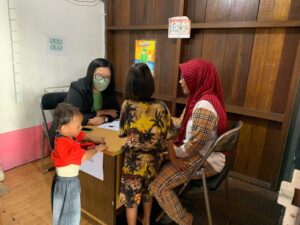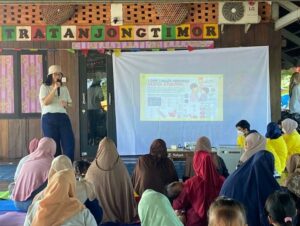
In Indonesia, 1 in 3 children are stunted in 2021, and specifically in Kepulauan Seribu as many as 27.1% of children are detected stunted. Based on the z score examination conducted by the Community Service Team (Pengmas) from the Vocational Education Program of Universitas Indonesia (UI), 3 out of 13 children in Tanjong Timur, Panggang Island, Kepulauan Seribu, suffer from stunting.It is commonly detected in children who have not regularly washed their hands with soap and have had diarrhea.
This community service provides counseling and training for health workers and local residents on basic knowledge of early detection of stunting in children under five years old on Panggang Island. If a child is stunted, his academic performance will also be affected due to disruptions in brain development, motor skills, and other vital organs. According to the World Health Organization (WHO), stunting can be characterized by physical characteristics, such as a child’s height below the normal growth standards accompanied by interference and inhibition of development in other organs.
“Stunting is a chronic malnutrition problem caused by poor eating habits and sanitation. One way to prevent and overcome it is conducting early detection in the first 1,000 days of life, improving children’s nutritional intake, and teaching children to live in clean and healthy habits, especially washing hands with soap,” said Triana Karnadipa, S.Ft., Physio., M.Sc., head of the Community Service Team (Pengmas) of the Physiotherapy Study Program, Vocational Education Program, Universitas Indonesia (UI), who conducted counseling at the Child Friendly Integrated Public Space (RPTRA) Tanjong Timur, Panggang Island, Kepulauan Seribu, on Friday (19/08).

The community service team provided free nutritional status checks on children under five years old, as well as education to parents on stunting prevention acts. The examination consisted of measuring weight, height, BMI, and calculating the z score. Follow-up service was provided in the form of education on the 6 steps of washing hands with soap for 60 seconds and the right time to wash hands for parents and children.
She further explained that health workers and parents were also trained to calculate the z score to determine their children’s nutritional status and growth trends. Thus, they can detect the incidence of stunting in children independently and can take action to improve children’s nutrition and health as early as possible.
Another activity in this community service is the movement of washing hands with soap effectively, which is one of the clean and healthy living behaviors. The team also provided training to health workers and mothers on Panggang Island so that they can teach their children to always live a clean and healthy lifestyle, so stunting can be prevented, and children’s growth and development can be optimized.
“Activities like this are very helpful for housewives who lack knowledge about health and sanitation. The information provided can guide the community to be more aware and understand how to prevent stunting in children,” said Sakinah, one of the counseling participants and health workers on Panggang Island.



